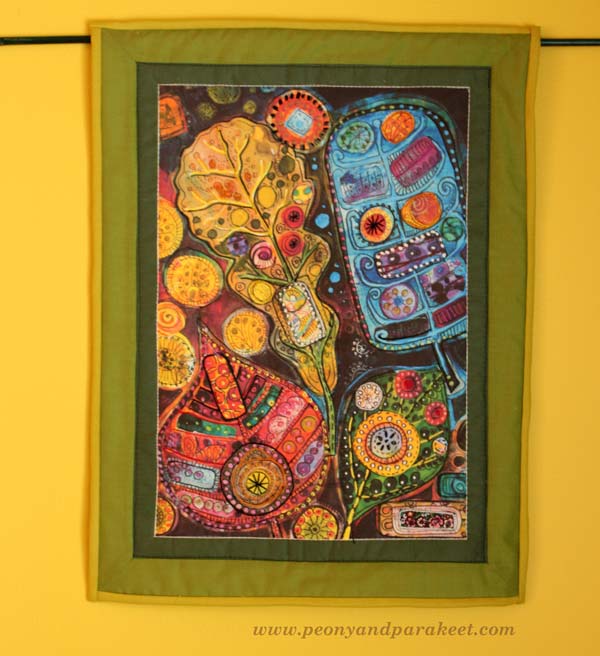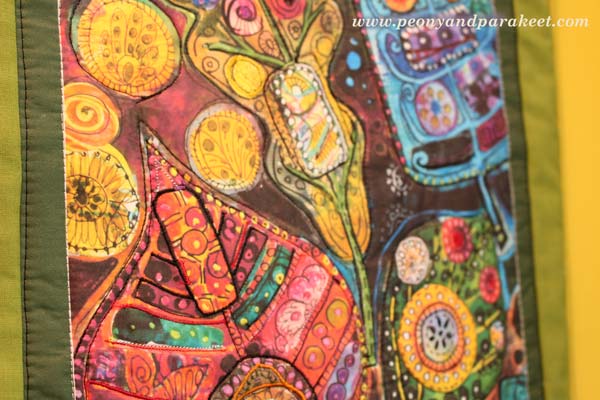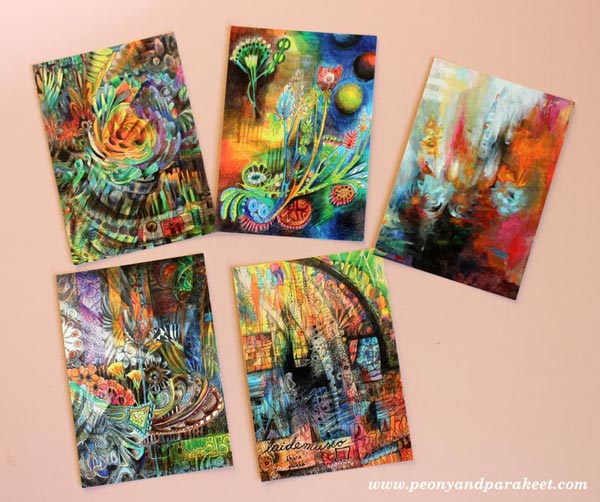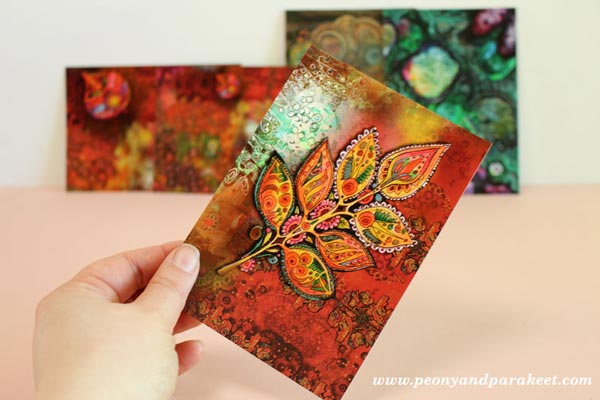Few Thoughts about Creating Art
Inspirational Drawing – Click here to sign up!
Art Quilts in a Modern Way

Here’s something that I have wanted to show you for a long time! I have been working with a custom order which made me think of a new idea: to create fabric prints and make quilted wall hangings from them. This idea is very versatile as you don’t have to be a quilter, you can print your art on fabric and use it for bags, purses, clothes – anything!
The artwork above has been composed digitally of various art pieces that I have made. The person who ordered the wall hanging is a fan of modern folk music and the color red. (If you have not listened to modern folk songs, try Hanneke Cassel for example!)

I created one new collage piece for the artwork. All the other details are picked from my archives.
It was pretty exciting to send the artwork to Spoonflower. When I received the fabric, the print quality was really sharp and detailed! I already knew from the previous experiences that big areas of black don’t print well, so I avoided those.
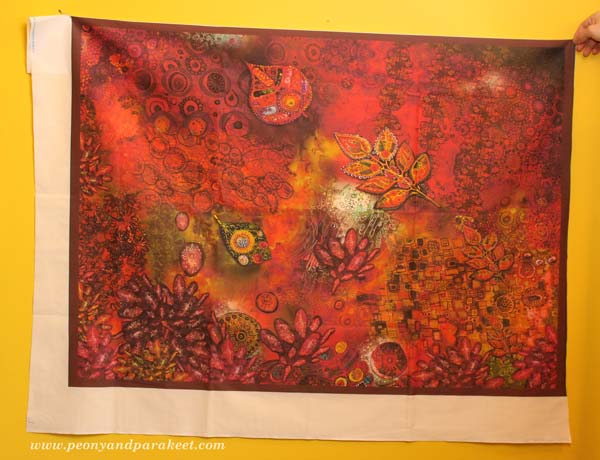
If you are a quilter, you know that the fabric will look so much better when quilted! I sandwiched cotton wadding, two layers of fusible interfacing and backing fabric and took out my sewing machine.
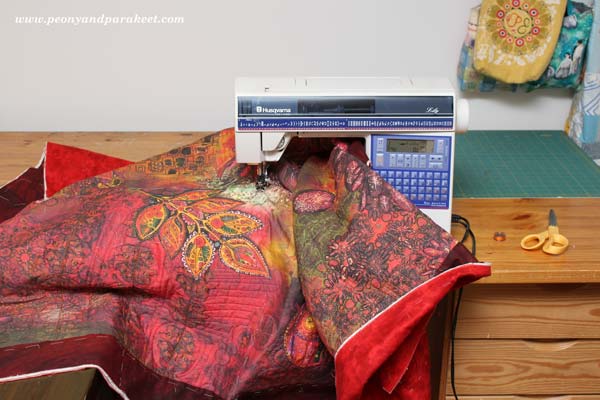
I am not very experienced with free-motion quilting using the free-motion foot, so I used even-feed foot instead. But with patience, I was able to create quilting that enhanced my brush strokes.
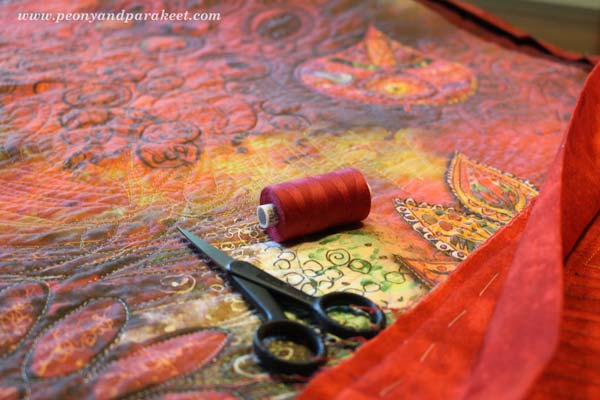
The finished quilt is about 45 x 39 inches.
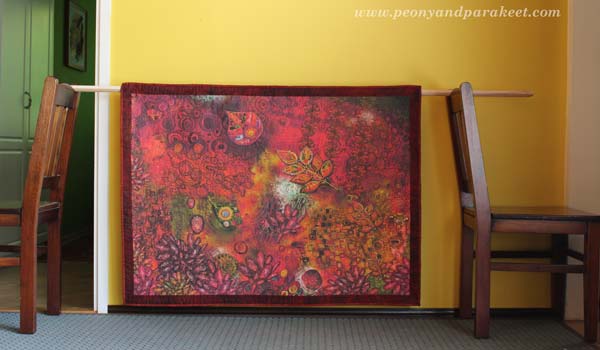
I used various colors of shiny embroidery threads for quilting. Using black thread brings the real black that was not produced by digital printing.
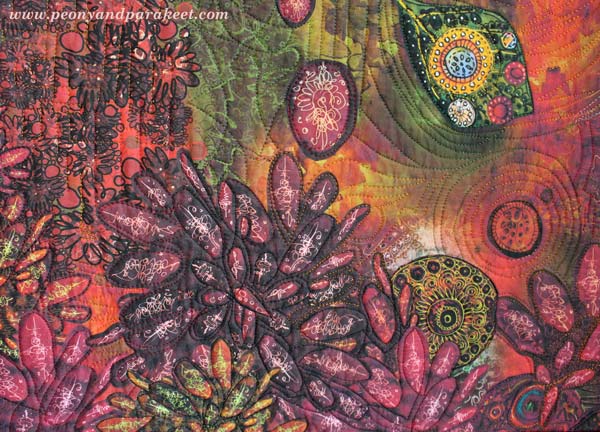
Quilting on watercolor!
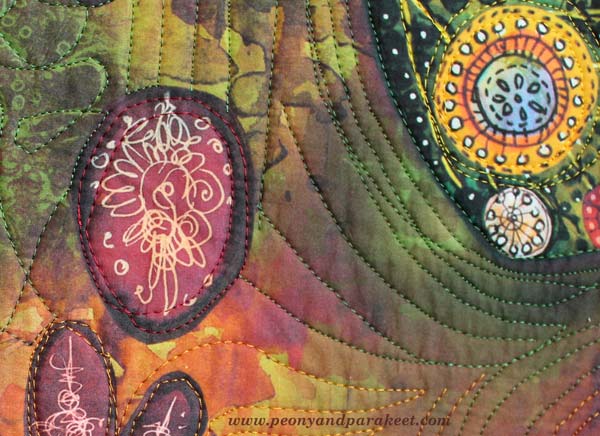
Entering the flow state when playing modern folk was in the center of my inspiration.
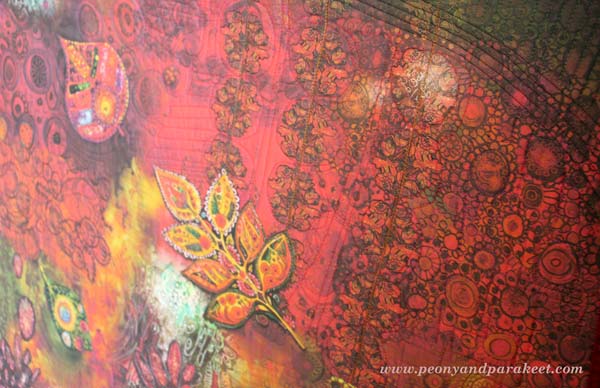
I added the label to the printing file too.
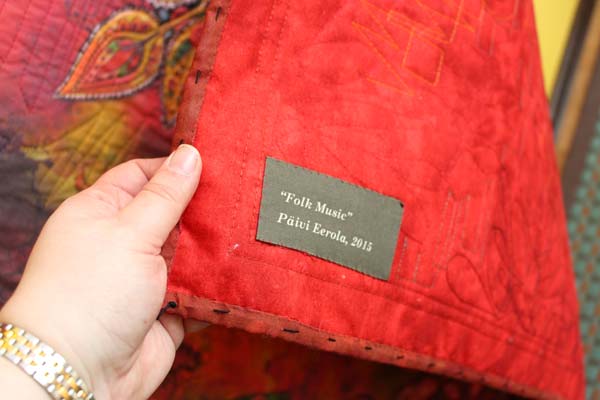
Here’s another project that I actually made earlier to test the idea. This one does not contain much digital processing, I only took a good photo of the original art and enhanced it a little bit.
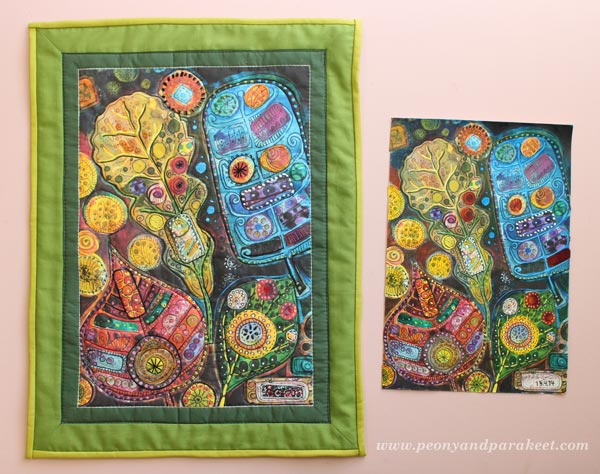
I think this artwork looks really good on fabric! The actual idea when creating the original was to mimic hand embroidery! Read about creating the original artwork: When Pens Replace Needles
I added some embroidery before quilting but found out that quilting works well as decoration.
A printed fabric label can be found from here too.
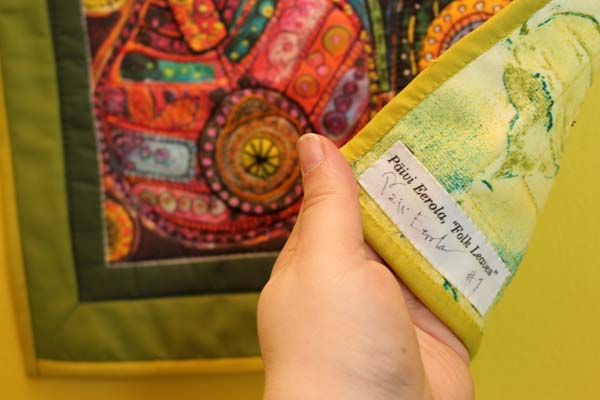
I also have more fabric prints waiting to be transferred into art quilts!

Paper prints news: New card sets have arrived at my Etsy shop.
Life can never be too colorful!
Stella and Cosmo send their greetings to all artists and quilters: Have a relaxing weekend!
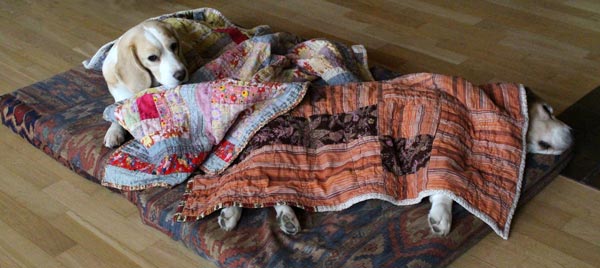
Let me be your art teacher: Subscribe to my weekly emails!
Why Paint Intuitively?
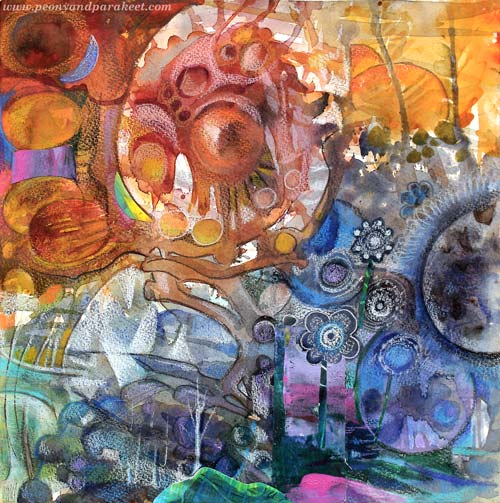
I have created this artwork using my intuitive painting methods. I had a busy week with many deadlines. Now, on Friday, when I stared at the blank watercolor paper, I felt that working in fast pace had disconnected me from my feelings. But then, this has happened many times before, so I just followed my tricks to get the painting on its way.
In most cases and especially when life gets busy, I choose to work intuitively, meaning that I do not plan the end result. My idea of fully experiencing art is to plan the process, but not sketch or otherwise pre-imagine the end result. I recommend this approach to everyone – at least once in a while. Why?
1) For once, you will let your creativity decide.
For many, this is rare: setting rationality aside. While living a busy life and organizing everyday chores, it is not so easy to suddenly start performing creatively. If your creativity never gets to decide, it might not have anything to say anymore.

When you paint intuitively, you can do against all those dont’s and won’ts that you keep hearing when your rationality is speaking. I find this kind of disobedience and freedom refreshing. It also brings balance to life.
2) You will use colors more creatively.
I often hear people saying that they need to learn more about colors. I used to wonder what it would be – color theories? In the end, there’s not so much to learn to get some results, even if you studied the master of colors Josef Albers and his color theory. But after working with colors and teaching the use colors, I get it: many people use too little variation in color. Color areas look more alive when they are not even. They can also contain controversial and muddy tones; it just makes the bright tones pop.
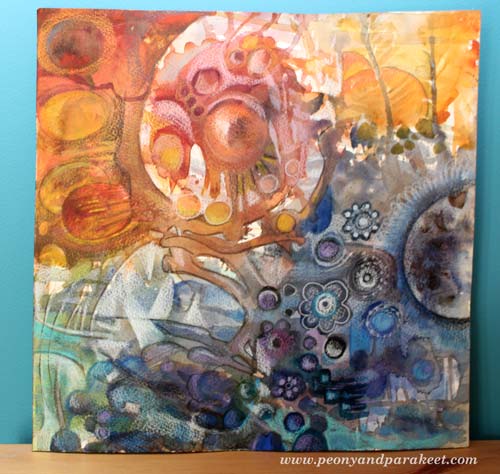
When you start painting intuitively and do not aim for a certain result, you will more likely get colors mixed together. At the certain point, like me when making this artwork, you might want to decide what your painting represents of. But then your grass will not be green, and your sky will not be blue. (Actually, here it’s vice versa!) Furthermore, there will be much more to look at than big even color areas or evenly spread, individual, same-sized elements that our rational side is so fond of.
3) You will find a fast route to your own style.
After you have practiced working intuitively, you will begin to see similarities in your work. You will get to know the little things your creative side loves. From those, you can start building your own style! Many people think that if they gather images that they are especially fond of, that will make them find their style. But 100 Pinterest boards is nothing compared to practicing intuitive painting. Why?
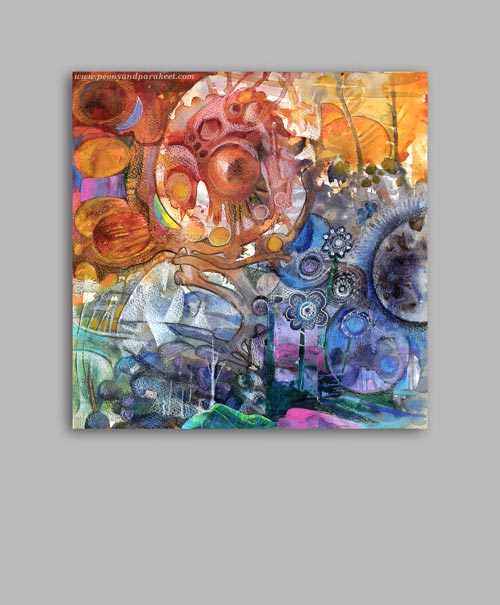
Because your style is not defined by the things that you love at the moment. First, our desires are often affected by trends and general aesthetics, among other things. Second, we easily admire things that might have some resemblance to our style but tend to take it too literally. For example, I admire very simple graphic patterns. Still, my style is far from that. Someday, it might develop to that. But at the moment, the essence of my art is somewhere else. It might be my love for textiles that trigger the appeal for those graphic shapes.
Paint intuitively, paint naturally!
In the perspective of intuitive (meaning natural), it would be totally wrong to rationally copy the images and then be disappointed not being that good. When you paint starting from your inner world, you will find your own unique ways to self-expression. You will also be able to develop your style in line with the continuous changes that happen in your life.
The intuitive approach also makes painting fun and exciting. In the end, that’s what using creativity is essentially about!
Experiment by using a step-by-step process!
>> Buy Watercolor 101 for Intuitive Painting
More Time, Better Art?
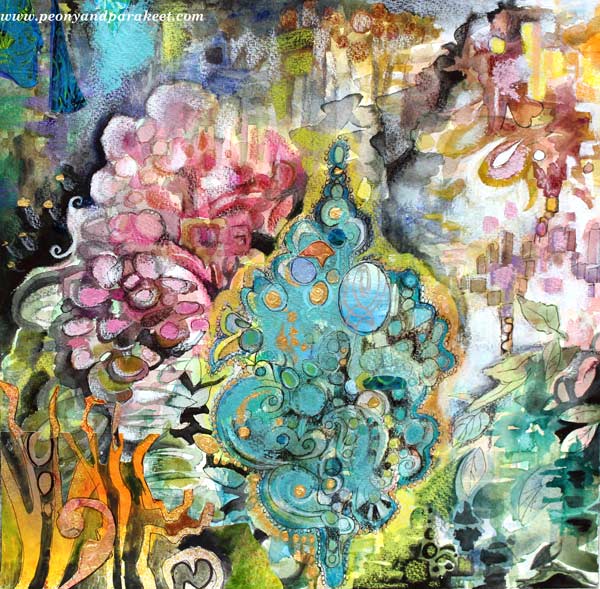
This artwork was inspired by Rococo, the 18th-century-period style with curves, asymmetry, gold, and ornaments. When I think of Rococo, I think of time. How long did it take to sew those elaborate women’s dresses? What about the porcelain table clocks, how many people, how many months did it take to get one finished and working?
The time we are living now is totally different. Not that I want to spend half of my life embroidering one chair. But I cannot help thinking: sometimes we create quantity but not quality. We get frustrated with our lacking skills and weak artistic vision, but often, there’s a simple solution: time. So, instead of creating three pages in a week for your art journal, make one!
Creativity needs time. The first thoughts are often the least innovative. When we take time to dig deeper, we reach not only frustrations but also new solutions.
Working in Short Periods of Time
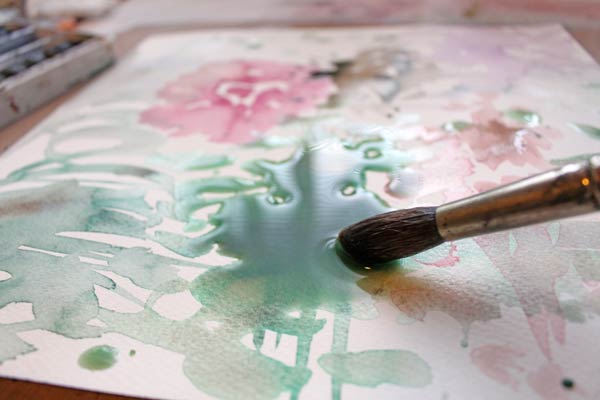
I used to have a difficult time working in several sessions. I wanted my work to be finished in one go. Leonardo da Vinci certainly did not have problems like that! He spent over ten years painting Mona Lisa. Of course, he did not dedicate all of that time to one painting; he did other things too. But he let his subconscious work during the breaks. So I did da Vinci – while waiting for the watercolor to dry, I engaged myself in other activities.
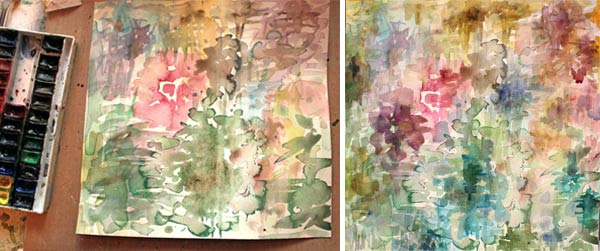
I built the foundation for this work with several thin layers of watercolors. Then I worked with colored pencils and watercolors to add details. A small flat brush is my favorite when adding details with paint.
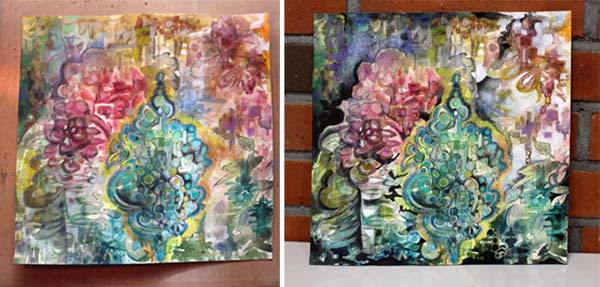
Some might call it finished at this point, but I wanted to add tension and interest. As this was about Rococo, some shimmer seemed appropriate!
Rococo Glitter!
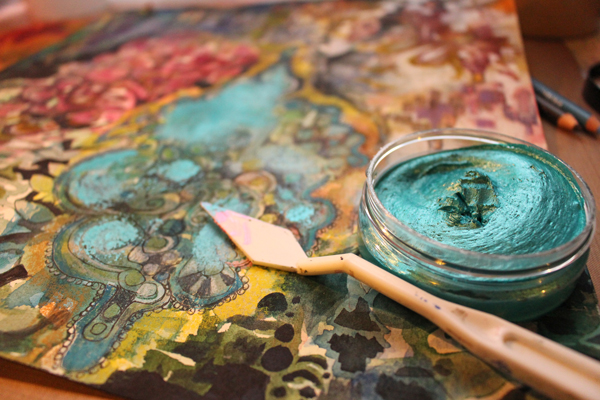
I have a few jars of Inka Gold, beeswax-based metal paint. They seemed just right for this artwork. And speaking of Rococo, some gold would be appropriate too. I love Golden brand’s gold acrylic paint.
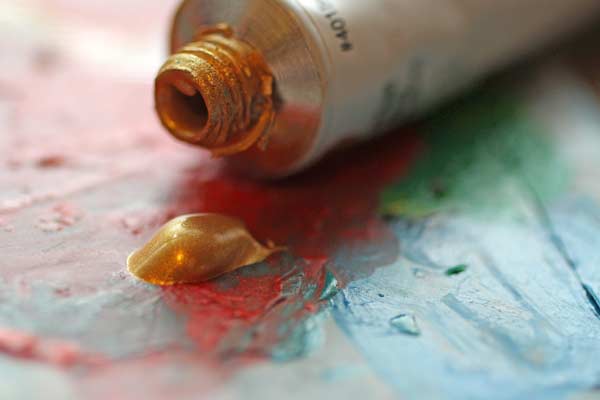
Finishing
Some hand-decorated papers added richness and variation. Then I continued completing the tiny details.
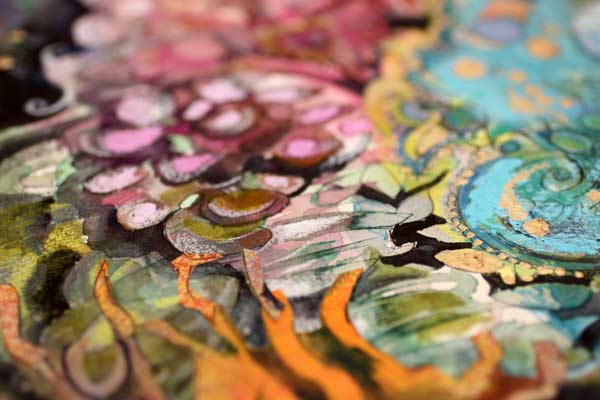
The size of the artwork is 12 inches by 12 inches. It took about three days from start to finish.
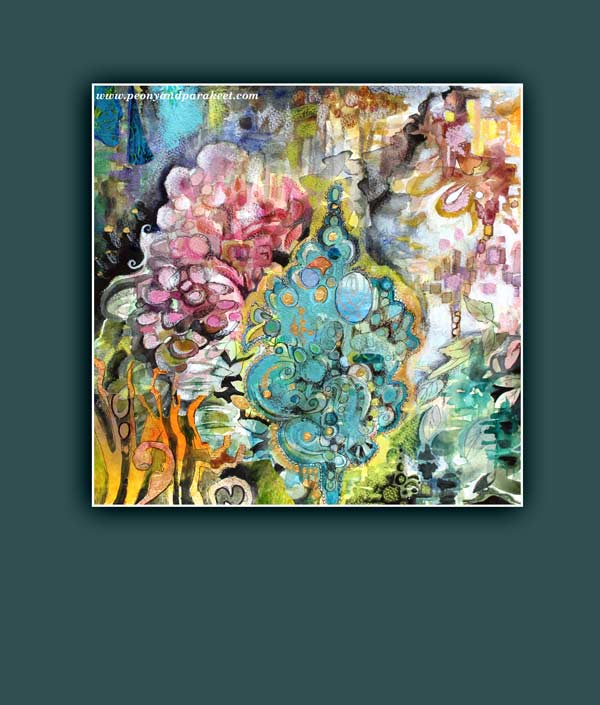
The quality of one artwork cannot be measured by the time the artist spent with it. Great art can be born quickly when skills and creativity meet. But on the other hand, if you want to improve your art and increase your creativity, why not focus on one artwork for a bit longer time.
What do you think? Can you make time work for you?
